Voters will head to the polls this fall to decide whether Oklahoma City should move forward with a new General Obligation (GO) bond program that would invest in critical infrastructure projects without raising property tax rates.
In a unanimous vote this week, the Oklahoma City Council approved an October 14 election to ask voters to authorize the bond, which Mayor David Holt described as a necessary investment in the city’s needs.
Related: State of the City 2025: Mayor Holt to highlight Thunder’s future, Olympic events in OKC
“These votes have always been about maintaining what we have,” Holt wrote in a Facebook post Monday. “They cover needs, not wants.”
The 2025 GO bond proposal was developed over the past year through public input and detailed planning by city staff. The proposal builds on earlier investments from Better Streets, Safer City, and MAPS 4, while focusing on foundational infrastructure, including streets, bridges, drainage, public safety facilities, parks, libraries, and transit.
Largest street investment in Oklahoma City’s history
More than 56% of the proposed bond package is dedicated to streets, bridges, and traffic infrastructure, which city leaders say marks the largest single investment in streets Oklahoma City has ever made.
The remainder of the package supports improvements to drainage systems, fire and police stations, parks and recreation facilities, libraries and learning centers, housing and city maintenance buildings, economic development, and transit infrastructure.
Related: Water main break closes northwest OKC street, damages businesses
No tax increase for property owners
Mayor Holt emphasized that the plan will not raise property tax rates. The GO bond would be funded through the city’s existing 16-mill property tax rate, with new bonds issued as older ones are retired. This method allows the city to maintain consistent revenue for capital projects while keeping the tax burden stable for residents.
The GO bond’s website claims that around 14% of a homeowner’s total property tax bill goes to the City of Oklahoma City. The rest is distributed to local schools, the county, and other taxing entities.
How are bond projects chosen?
The city received over 6,000 project ideas from residents during a months-long public engagement effort. Projects were considered based on community need, citywide equity, and alignment with ongoing infrastructure plans.
The GO bond’s website states that, although not every submitted project was included, the selected list aims to reflect a balanced distribution of improvements.
A portion of the bond is also set aside for unforeseen needs, allowing for flexibility in addressing potential future issues.
The bond will appear on the ballot on October 14, 2025, and construction on many projects is expected to commence approximately one year after the bond is approved.
Oklahoma To Host 2028 Olympics Events OKC Proposes $3.6 Million Transfer For Riversport Improvements Ahead Of 2028 Olympics Oklahoma City Mayor David Holt On Sen. Jim Inhofe, 2028 Olympics Oklahoma City Mayor Preparing For 2028 Olympics Following Return From Paris Games Q&A: Oklahoma City gears up for 2028 Olympics Former Senator On 2028 Olympics Events In Oklahoma City OKC Approves New Thunder Arena Oklahoma City Voters Approve Taxpayer Dollars To Fund New Arena, Keep OKC Thunder Oklahoma City Council passes new Thunder arena agreements Thunder lock in long-term future in Oklahoma City with new arena agreement Oklahoma City Council Approves Arena Development Plan In 7-2 Vote Arena Development: Downtown OKC Restaurant Owner Talks Potential Impact Of New Arena New Developments In OKC: Possible Arena Location, Airport Travel Grows Oklahoma City Council Approves Agreement With Consulting Firm For New Arena Oklahoma City Council Hires Architect For New Arena Oklahoma City Hires Architecture Firms For New Thunder Arena Downtown OKC Prepares For Demolition Ahead Of Construction Of New $900 Million Arena

